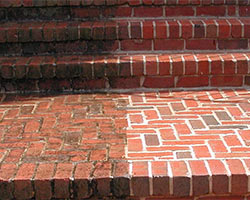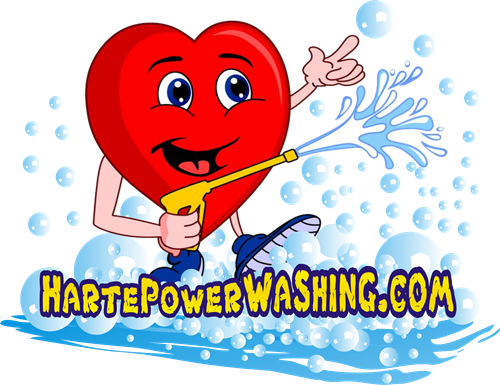Common Pressure Washing Questions
 Here are the answers to common pressure washing questions we hear from our customers. We hope it you find it helpful!
Here are the answers to common pressure washing questions we hear from our customers. We hope it you find it helpful!
Why is it important to pressure wash?
- Pressure washing has benefits beyond keeping the aesthetics of your property looking as clean and new as possible. Pressure washing can help tackle damaging substances such as oil, dirt, mold, mildew, and rust. By removing these substances before damage occurs, it helps to preserve the value of your property, and to help keep the people around the property healthy. Lastly, if you plan on painting or refinishing a surface, pressure washing can help get the desired surface ready.
How long does pressure washing take?
- Typically, a pressure washing job can take between 30 minutes and 2 hours. This is heavily dependent on the size of the property being washed. An additional 30 minutes for setup should be allocated. Houses up to 1,500 square feet can typically be washed within 30 minutes. For much larger houses, such as 2 story houses ranging between 3,500-5,000 square feet, 2 to 3 hours should be allocated for a complete wash.
How much does a pressure washing job cost?
- The cost of a professional pressure washing job varies greatly based on a variety of factors. Typically, prices tend to hover around $200 per job. However, the area your property is located in can make the cost substantially higher. In addition, cost is dependent on how many surfaces and walls are being cleaned, as well as the square inch total of the property. Lastly, if special equipment is needed specifically for your property, the cost can definitely rise. While it may seem expensive, it is still a better option than potentially damaging something via a DIY cleaning, and ultimately having a much larger expense down the road.
Will pressure washing remove paint?
- It is possible for paint to be removed via pressure washing. By aiming downward and using a PSI (Pounds per Square Inch) setting between 2,000-4,000 PSI, paint can be removed from a variety of surfaces. Keeping a distance of at least 12 inches is recommended.
Will pressure washing remove mold?
- It is possible for mold to be removed via pressure washing. With the use of a high PSI setting, as well as the cleaning agent of choice for a pressure washer, the mold can be blasted away. Furthermore, pressure washing has a major advantage over a store-bought mold remover, being that pressure washing can stop the mold from growing back, as opposed to a store-bought cleaner simply removing the visible mold.
Will pressure washing remove rust?
- It is possible for rust to be removed via pressure washing. It is imperative to tackle rust immediately, as otherwise it can cause irreversible damage to metal. With the use of a high PSI setting, rust can be blasted off easily, however it should always be evaluated by a professional first. Use of a store-bought rust remover is not advised, as the acid can cause further permanent damage to the surface.
Will pressure washing remove oil stains?
- It is possible for oil stains to be removed via pressure washing. With the use of hot water from the pressure washer, as well as a substance such as trisodium phosphate, oil stains can be removed. It should be noted that depending on the age of the stain, it may not be able to be removed from concrete.
Can pressure washing kill plants?
- Since pressure washers work with chemicals, there is always a risk to foliage. There are methods to help keep plants alive, one of which being using clear water on the plants before beginning the use of any chemicals. If any of the chemicals were to accidentally get on the foliage, they would be diluted to help them survive. Some pressure washers may also opt to use an oxygen based bleach if working around a lot of foliage.
Can pressure washing damage windows?
- It is possible for windows to be damaged while pressure washing. One of the easiest ways to lower the risk of damage is to use a pressure washer that has an adjustable PSI setting; a lower PSI results in less power to safely wash delicate surfaces such as windows. When washing double pane windows, it is advisable to keep more of a distance compared to single pane windows, as both windowpanes can be damaged if water breaks the seal between them.
Can pressure washing damage brick?
- It is possible for brick to be damaged while pressure washing. Bricks are one of the many surfaces that are advised to be washed with a lower PSI setting. Should someone inexperienced with pressure washing attempt to wash a brick surface, they run the risk of surface degradation, or even destroying the mortar between bricks. A good method of precaution is to keep your nozzle at least 12 inches from the target surface.
Can pressure washing damage concrete?
- It is possible for concrete to be damaged while pressure washing. Much like brick surfaces, concrete runs the risk of surface degradation. The same precautions for washing brick surfaces apply to washing concrete surfaces – using a lower PSI setting, and keeping at least 12 inches between the surface and the nozzle.
Can pressure washing damage vinyl siding?
- It is possible for vinyl siding to be damaged while pressure washing. While vinyl siding is considered a hard surface, it is still advisable to use a lower PSI on these surfaces. Use of a high PSI setting can result in needing to get the siding replaced, or even have the water penetrate the siding and enter the walls of the property.
Are there any health risks with pressure washing?
- Being a pressure washer does come with its own set of health risks. Pressure washers are exposed to chemicals and dangerous noise levels on a daily basis. Pressure washers not only have to worry about falling from heights when working on ladders and roofs, but also temperature as it can result in heat stroke.
How often should I have my property pressure washed?
- There is no set guideline on how often you should have your property pressure washed. There are, however, a few key factors to help you determine if your property is overdue for a pressure washing. During a hot or humid weather season, mold or mildew may begin to accumulate on your property, as well as rain or debris from a major storm. If your property gets dirty frequently, then getting it washed every couple of months is advised.
Ready to Pressure Wash Your Property?
Our professional team stands ready to help you restore the appearance of your home, driveway, walkways and more!
